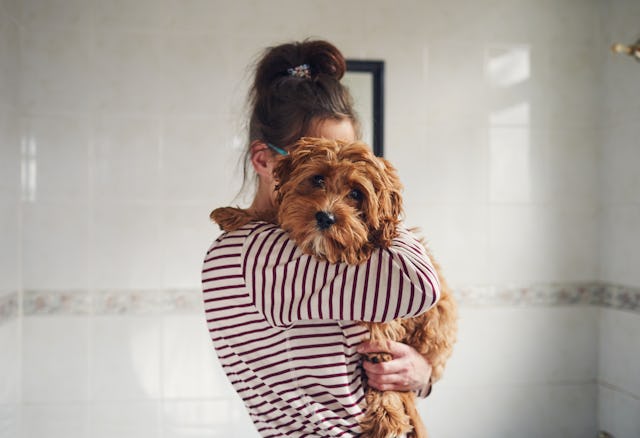Is It Normal To Love Your Pet More Than Your Kids?
Pets don't ask for much, and you'll never need to pay for their college tuition.

As a child-free by choice married woman in my thirties, I’m used to people asking questions about the status of my womb. My default answer typically involves something to the effect of “Right now, my dog is my baby!” — this usually elicits a chuckle, but occasionally inspires some serious truth-telling.
A recent store associate’s response: “If someone had given me the option, I would have adopted a collection of dogs. I love my kids, but I love my dog so much more.” She proceeded to gush about the uncomplicated, unconditional love and companionship her dog provides — a sentiment I’m certainly familiar with — and it made me curious about the psychology behind loving your pet more than your human children.
Is this a real thing, and if so, is it normal? According to a mental health pro, it’s definitely not unheard of, especially since raising humans is hard as hell at every single stage of life.
Being responsible and caring for any living being can be complicated, but the behavioral and health concerns of pets and children are vastly different, as Dr. Julian Lagoy, M.D., a psychiatrist with Mindpath Health, tells Scary Mommy. “It is possible to love your pet more than your children, since your own children are more likely to cause you more headache and stress and ‘drama’ than a pet. It is also much easier overall to care for a pet than to care for a human child, who over time has more complex needs.”
While puppies are no picnic, and exhausting (and expensive!) health issues pop up with pets of all ages, it’s easy to wax poetic about how much simpler life with your pet is when you’re knee-deep in the third diaper explosion of the day or your teen is serving up attitude in spades. Plus, pets typically fall into your routine, and with kids, every single day presents challenges big and small. Not to mention, pets don’t talk back, slam doors, or ask for much beyond their basic needs and as much lovin’ as you’re willing to give. There’s also no hefty bills for school supplies, college tuition, or expensive gadgets they have to have.
So if you find yourself way happier to see your furry friend when you walk in the door than you are your own flesh and blood, it makes sense. Research backs this up: a 2019 survey of 2,000 pet owners found that 34% of parents prefer their pets to their kids. A 2014 analysis found that moms’ brains were similarly activated upon seeing both their children and their dogs, highlighting the similarity of the emotional bond between mothers and their children, human and fur.
“This feeling can happen with all sorts of pets, although it is more common to see with dogs and cats compared to less ‘cuddly’ pets such as fish,” notes Lagoy. “Humans historically have felt more companionship with dogs and cats than other animals.”
Of course, it’s worth paying attention if you find yourself frequently placing the priorities of your pet over those of your human kids. If you’re feeling any deep resentment or even just a lack of love towards your kids, there’s no shame in that, but it might be worth exploring with a mental health professional you trust, says Lagoy.
“Obviously one should love their own children more than pretty much anything; however, the love for a pet is different from the love for a child,” he says. “If a pet is prioritized unconditionally over a human child and treated with more care, you might consider seeking professional guidance.” A therapist can help you navigate these feelings in a shame- and judgment-free space, giving you the time and tools to work through what might be behind your emotions.
The bottom line, per Lagoy: Your feelings are totally valid. “You should not feel too guilty if sometimes you love your pet more than your child, especially when your child is acting very difficult in a way that your pet never would,” he says. So there’s no shame if your heart swells just a bit more upon seeing that wagging tail or a curled up cat on the couch — there’s no limit on love, and it’s OK to be secretly grateful for the snuggles of a four-legged friend at the end of a long, tough day with your kiddos.
This article was originally published on